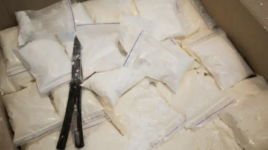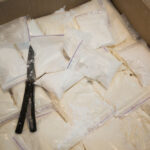Truck Driver Found Not Guilty of Attempting to Possess 400kg of Unlawfully Imported Cocaine

A truck driver accused of driving from Melbourne to Far North Queensland to collect 400 kilograms of cocaine with a street value of $140 million has been found not guilty of attempting to possess a commercial quantity of unlawfully imported border controlled drugs.
Osman El-Houli was arrested when Queensland Police found his truck parked near the small town of Mareeba in far North Queensland, the same day an airplane loaded with the nearly pure cocaine crashed during take-off in Papua New Guinea.
Evidence before the court
Mr El-Houli told police that a man known as “The Professor” had paid him “a lousy” $10,000 to drive nearly 3000 kilometres to drop off plasterboard in Queensland.
However, once enroute, he was given a different task – to collect bags of cash, conceal it in the plasterboard in his truck and return to Melbourne.
Mr El-Houli also given an encrypted phone for the trip, and bags for the cash.
The prosecution alleged that Mr El-Houli drove for more than three days to collect the cocaine, which never arrived after the crash landing.
Law enforcement agents believed the operation was run by a syndicate consisting of a Colombian group and members of the Melbourne mafia.
Prosecutors argued that “deep down” Mr El-Houli must have known or have been reckless to the fact there were drugs involved, which they needed to prove beyond a reasonable doubt in order to establish the offence.
However, the jury found within hours that Mr El-Houli was not guilty of the offence charged.
Cocaine is big Business in Australia
Cocaine is big business in Australia, with figures from 2021 showing that Australia has the highest per capita consumption of cocaine in the world, with the cocaine trade estimated to worth around $2 billion annually, with about five and a half tonnes consumed each year.
At the end of last year, the price of cocaine soared to its highest levels, with the NSW Crime Commission reporting that the street price of cocaine is almost double pre-pandemic levels, now about $420 a gram.
Cocaine has always been considered a party drug for the right and famous, but increasingly drug surveys and the national wastewater analysis programme shows that cocaine use is more widely spread than just in the affluent areas of our capital cities. It is rapidly becoming a drug of choice, and a substance that is used with some frequency – not just on special occasions.
While police believed that the price hike at the end of 2022 was the result of a number of large, high-profile seizures which had made headlines through the year, drug experts say that’s not the case – supply shortage tend to be short-live, and may bump up the price, but that typically only about 10 to 15 percent of drugs are actually seized by law enforcement.
The offence of attempting to possess a commercial quantity of unlawfully imported border controlled drug
Possessing a commercial quantity of unlawfully imported border controlled drug or plant is an offence under section 307.5 of the Criminal Code Act 1995 (Cth) which carries a maximum penalty of life in prison.
To establish the offence, the prosecution must prove beyond reasonable doubt that:
- You possessed a substance,
- The substance was unlawfully imported,
- The substance was a border controlled drug or plant,
- You knew, or were reckless as to whether, the substance was a border controlled drug or plant, and
- The amount possessed was the commercial quantity.
You were ‘reckless’ if you were aware it was likely that the substance was a border controlled drug or plant but went ahead with your actions regardless.
You are not guilty of the offence if you are able to establish, ‘on the balance of probabilities’, that you did not know the substance was unlawfully imported.
Examples of ‘commercial quantity’ include:
- At least 500 grams of MDMA (or ‘ecstasy’),
- At least 750 grams of amphetamines,
- At least 1.5 kgs of heroin,
- At least 2 kgs of cocaine, or
- At least 100 kgs of cannabis leaf
Attempts
Section 11.1 of the Criminal Code Act makes clear that a person may be found guilty of a crime under the Act if he or she attempts but fails to carry out the offence.
The section provides as follows:
(1) A person who attempts to commit an offence commits the offence of attempting to commit that offence and is punishable as if the offence attempted had been committed.
(2) For the person to be guilty, the person’s conduct must be more than merely preparatory to the commission of the offence. The question whether conduct is more than merely preparatory to the commission of the offence is one of fact.
(3) For the offence of attempting to commit an offence, intention and knowledge are fault elements in relation to each physical element of the offence attempted.
Note: Under section 3.2, only one of the fault elements of intention or knowledge would need to be established in respect of each physical element of the offence attempted.
(3A) Subsection (3) has effect subject to subsection (6A).
(4) A person may be found guilty even if:
(a) Committing the offence attempted is impossible; or
(b) The person actually committed the offence attempted.
(5) A person who is found guilty of attempting to commit an offence cannot be subsequently charged with the completed offence.
(6) Any defences, procedures, limitations or qualifying provisions that apply to an offence apply also to the offence of attempting to commit that offence.
Legal defence
A legal defence to all drug charges brought under the Criminal Code Act 1995 is ‘duress’, which means:
- Your actions were due to a threat of death or serious injury to you and/or a member of your family,
- There was no reasonable way to render the threat ineffective, and
- Your conduct was a reasonable response to the threat.
Going to court for a drug charge?
If you have been accused of a drug offence, call Sydney Criminal Lawyers anytime on (02) 9261 8881 to arrange a free conference with an experienced criminal defence lawyer who will accurately advise you of your options, the best way forward and fight for the optimal outcome.








